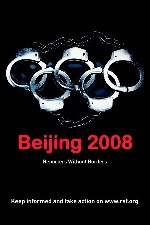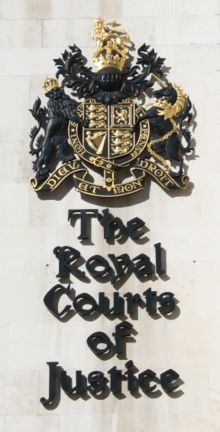10 Apr 2008 | Comment, News and features
 The increasingly farcical Olympic torch relay made its way to California yesterday. Lucie Morilllon of Reporters Without Borders was there
The increasingly farcical Olympic torch relay made its way to California yesterday. Lucie Morilllon of Reporters Without Borders was there
After the London and Paris demonstrations that disrupted the Olympics torch relay and angered Chinese officials, the world’s eyes were on San Francisco — the next city scheduled to welcome, 9 April, the symbol of the most controversial Games since Moscow 1980. A large proportion of the city’s population is Asian. The day before, exactly four months before the opening ceremony in Beijing, thousands of people attended a pro-Tibet rally and vigil with speeches by Desmond Tutu and actor Richard Gere. Other demonstrations had taken place before that event, including one involving activists who climbed the Golden Gate Bridge to display ‘Free Tibet’ flags. Protesters were warming up for the next day, as were the San Francisco police, the city’s officials, and the Beijing Olympic Committee. The route had already been shortened from eight to six miles, and was announced at the last minute in a clear attempt to prevent demonstrators from making plans well in advance. San Francisco Mayor Gavin Newsom had made sure that he would have some flexibility in addressing the issue. He said that the route could be changed at any time, depending upon how the situation evolved.
The torch relay was originally scheduled to start off at 1pm from McCovey Cove, follow the waterfront to Fisherman’s Wharf, and head back to Justin Herman Plaza. I decided to go out to keep track of the demonstrations at about 10.30am. My hotel was a couple of blocks from the Embarcadero. As soon as I left, I bumped into a group of pro-Tibet demonstrators, all carrying flags and posters. I followed them down the avenue. On our way, we encountered groups of pro-Chinese government protestors carrying huge Chinese and Bejing 2008 flags. The Chinese authorities had obviously decided to play the PR game and send their own people to counter the visibility of their opponents. The closer we got to the Justin Herman Plaza, where the closing ceremony was supposed to take place, the more the various groups of protesters began to intermingle and confront each other, sometimes resorting to verbal provocation and insults. A group of Olympic supporters came across some Tibetan monks and started yelling at them. At this stage I was worried that even a single gesture could turn the situation violent. But the Tibetan monks went on, while their followers made peace signs. The pro-Chinese protesters were playing drums to drown out the loud heckling on one side and cheers on the other.
(more…)
10 Apr 2008 | Middle East and North Africa, News and features, United Kingdom
 Arms trade campaigners are celebrating today, after a London judge decided that the director of the Serious Fraud Office should not have dropped an investigation into a multi-billion dollar arms deal. Padraig Reidy reports
Arms trade campaigners are celebrating today, after a London judge decided that the director of the Serious Fraud Office should not have dropped an investigation into a multi-billion dollar arms deal. Padraig Reidy reports
A court ruled today that the British government was wrong to intervene in a Serious Fraud Office investigation into dealings between BAE and the Saudi government.
The government had ordered the investigation to be halted, claiming it presented a threat to national security. It was alleged that the Saudi government had said it would no longer co-operate in intelligence and security if the investigation went any further.
In a ruling issued this morning, Lord Justice Moses said: ‘It is obvious, in the present case, that the decision to halt the investigation suited the objectives of the executive. Stopping the investigation avoided uncomfortable consequences, both commercial and diplomatic. Whilst we have accepted the evidence as to the grounds of the decision, in future cases, absent a principle of necessity, it would be all too tempting to use a threat as a ground for convenient conclusion: we fear for the reputation of the administration of justice if it can be perverted by a threat.’
He continued: ‘Our courts and lawyers have the luxury and privilege of common law and statutory protection against power which threatens the rule of law. All the more important, then, that they provide support and encouragement to those in a less happy position. How do they do so, if they endorse surrender, when in Uganda the courts are forced to resist when those whom they have released on bail are re-arrested on the court-room steps by armed agents of the executive, or when the Chief Justices of Fiji and Pakistan are deposed by military rulers?’
Symon Hill of Campaign Against the Arms Trade, which brought the case along with Corner House, said that the judgment upheld the principle ‘that might is not right, and the law should operate without fear, favour or prejudice’.
Susan Hawley of Corner House commented that ‘the ruling has strengthened our securities and freedoms’.
The judgment means the director of the Serious Fraud Office must now decide whether to appeal the decision, and whether to re-open the investigation.
9 Apr 2008 | News and features, United Kingdom
Motor racing supremo Max Mosley has failed in his attempt to stop the News of the World from publishing an extract from a video of him with several prostitutes on its website.
(more…)
7 Apr 2008 | Comment
 A new Indonesian law poses the threat of restrictions on the arts, writes David Jardine
A new Indonesian law poses the threat of restrictions on the arts, writes David Jardine
The Indonesian House of Representatives (DPR), after very lengthy debate, has passed into law a bill aimed at outlawing online pornography — this despite the document containing an unclear definition of what constitutes ‘pornography’.
The protracted debate — the bill was introduced in 2005 — has concluded with what appears to be a formula allowing religious legislators to insert easily manipulated concepts such as ‘immorality’ into the law.
Some observers, including Zatni Arbi, the country’s leading information technology commentator, have warned that the new law, which criminalizes the provision, use and transmission of pornographic websites, might in the future be used to shut down other websites carrying information and opinion deemed by the government to be unacceptable.
(more…)
 The increasingly farcical Olympic torch relay made its way to California yesterday. Lucie Morilllon of Reporters Without Borders was there
The increasingly farcical Olympic torch relay made its way to California yesterday. Lucie Morilllon of Reporters Without Borders was there

